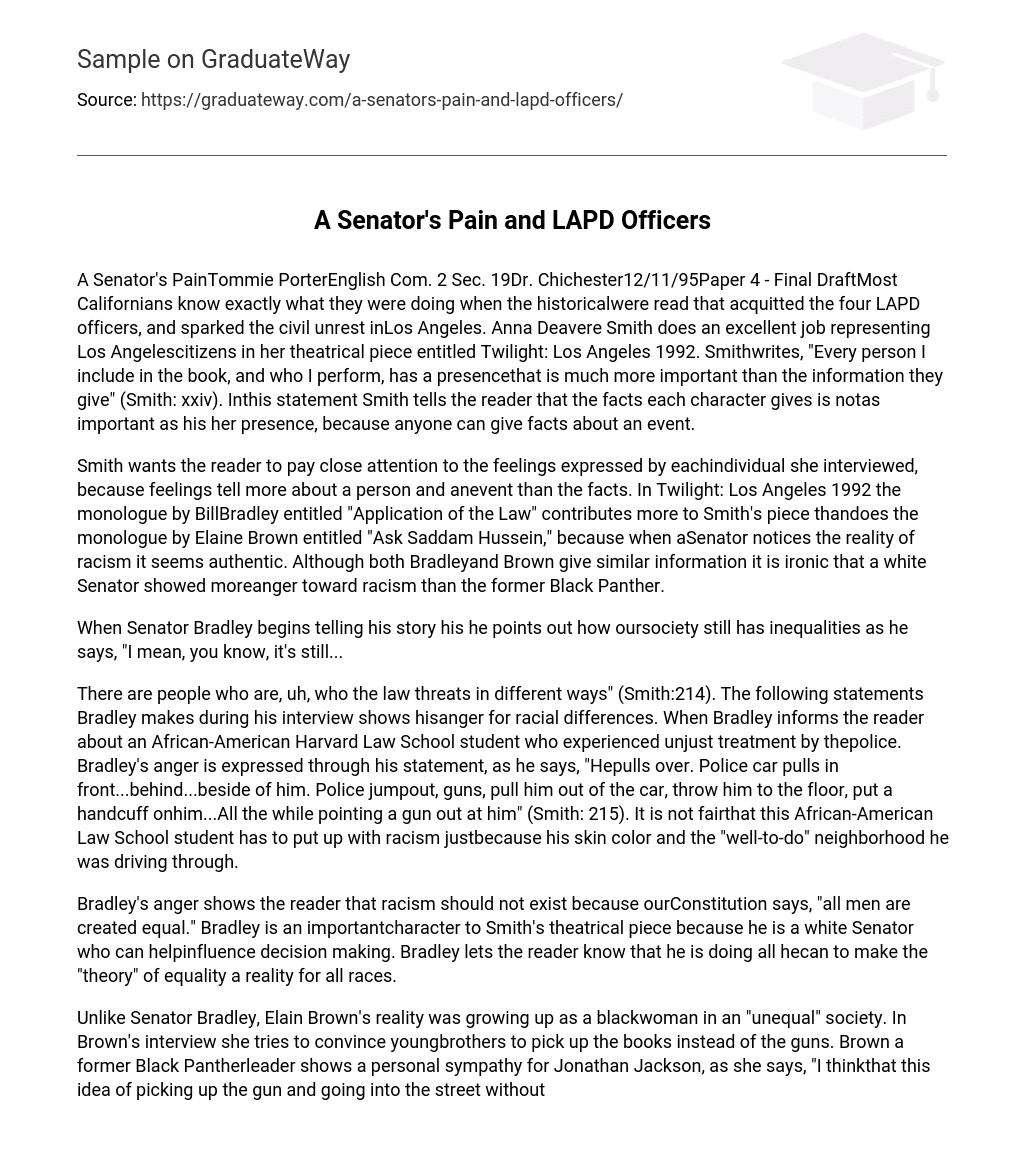Californians know exactly what they were doing when the historicalwere read that acquitted the four LAPD officers, and sparked the civil unrest inLos Angeles. Anna Deavere Smith does an excellent job representing Los Angelescitizens in her theatrical piece entitled Twilight: Los Angeles 1992. Smithwrites, “Every person I include in the book, and who I perform, has a presencethat is much more important than the information they give” (Smith: xxiv). Inthis statement Smith tells the reader that the facts each character gives is notas important as his her presence, because anyone can give facts about an event.
Smith wants the reader to pay close attention to the feelings expressed by eachindividual she interviewed, because feelings tell more about a person and anevent than the facts. In Twilight: Los Angeles 1992 the monologue by BillBradley entitled “Application of the Law” contributes more to Smith’s piece thandoes the monologue by Elaine Brown entitled “Ask Saddam Hussein,” because when aSenator notices the reality of racism it seems authentic. Although both Bradleyand Brown give similar information it is ironic that a white Senator showed moreanger toward racism than the former Black Panther.
When Senator Bradley begins telling his story his he points out how oursociety still has inequalities as he says, “I mean, you know, it’s still… There are people who are, uh, who the law threats in different ways” (Smith:214). The following statements Bradley makes during his interview shows hisanger for racial differences. When Bradley informs the reader about an African-American Harvard Law School student who experienced unjust treatment by thepolice.
Bradley’s anger is expressed through his statement, as he says, “Hepulls over. Police car pulls in front…behind…beside of him. Police jumpout, guns, pull him out of the car, throw him to the floor, put a handcuff onhim…All the while pointing a gun out at him” (Smith: 215). It is not fairthat this African-American Law School student has to put up with racism justbecause his skin color and the “well-to-do” neighborhood he was driving through.
Bradley’s anger shows the reader that racism should not exist because ourConstitution says, “all men are created equal.” Bradley is an importantcharacter to Smith’s theatrical piece because he is a white Senator who can helpinfluence decision making. Bradley lets the reader know that he is doing all hecan to make the “theory” of equality a reality for all races.
Unlike Senator Bradley, Elain Brown’s reality was growing up as a blackwoman in an “unequal” society. In Brown’s interview she tries to convince youngbrothers to pick up the books instead of the guns. Brown a former Black Pantherleader shows a personal sympathy for Jonathan Jackson, as she says, “I thinkthat this idea of picking up the gun and going into the street without a planand without any more rhyme or reason than rage is bizarre and so, uh…And it’sfoolish” (Smith: 228). Brown’s contribution to Smith’s theatrical piece islimited because she does not show the authentic anger like Senator Bradley.
Even though both Senator Bill Bradley and former Black Panther leaderElaine Brown gave similar messages, their presence affects the reader in adifferent way. After reading Bradley’s monologue, I felt elated and anger. When Bradley questioned the partner at the law firm as he ask, “What did thepartner of the law firm do on Monday? Did the partner call the policecommissioner?” (Smith: 216). When Bradley begins asking question he lets thereader know that he is also bother by racism.
Yet in Brown’s monologue racism is not the problem. Brown wants toconvince the reader that guns are not worth his or her life. Brown tells thereader, “all one has to do is ask, to ask the Vietnamese or Saddam Hussein aboutthe power…of the United States” and how they take down threats (Smith: 228).
Brown wants young brothers to realizes how important their lives are to oursociety. In Twilight: Los Angeles 1992 when Anna Deavere Smith says, “Everyperson I include in the book, and who I perform, has a presence that is muchmore important than the information,” Bill Bradley and Elaine Brown are just afew of the characters Smith is describing. Bill Bradley was a white Senator whopeople might have thought would have agreed with the actions of the LAPD butironically he was angry. Senator Bradley’s monologue contributes more toSmith’s theatrical piece because of this irony. I wonder what our world wouldlike if we had more Senator’s like Bill Bradley?





